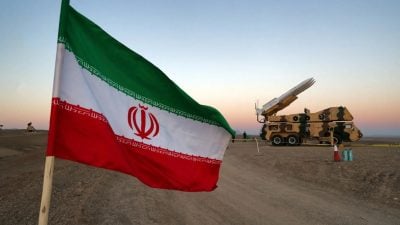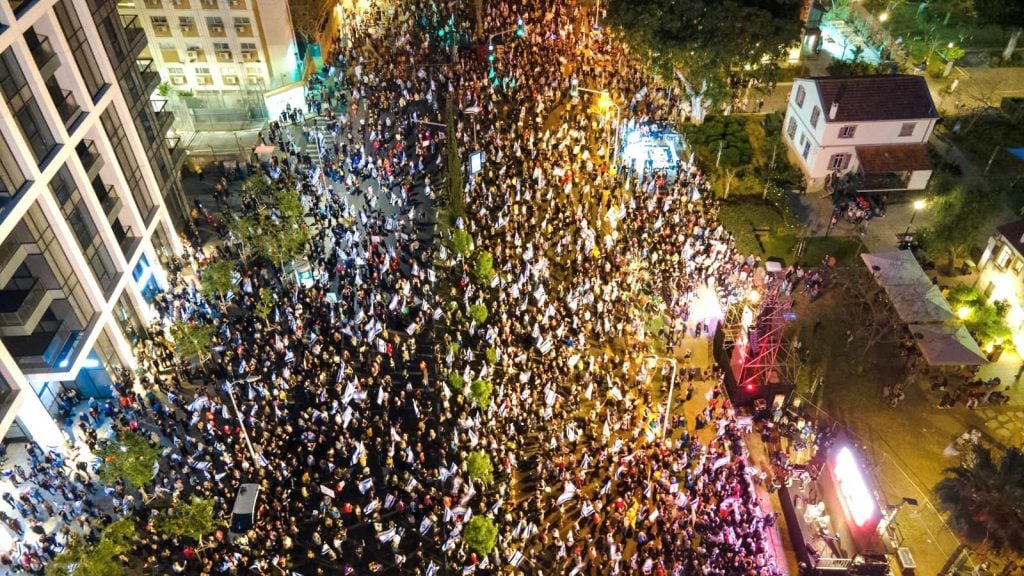Iran Strikes Inside Israel for the First Time

All Global Research articles can be read in 51 languages by activating the Translate Website button below the author’s name (only available in desktop version).
To receive Global Research’s Daily Newsletter (selected articles), click here.
Click the share button above to email/forward this article to your friends and colleagues. Follow us on Instagram and Twitter and subscribe to our Telegram Channel. Feel free to repost and share widely Global Research articles.
Global Research Referral Drive: Our Readers Are Our Lifeline
***
Israel started it. First came the unprovoked attack on the Iranian consulate in Damascus on April 1, which killed six Iranian military officials, including two generals, and six Syrian civilians who were pedestrians in the upscale Mezze neighborhood.
Iran’s Islamic Revolutionary Guard Corps (IRGC) confirmed the attack on Israel, saying it launched the drones and missiles under Operation True Promise on April 14 as a retaliatory strike.
This was the first-ever direct attack on Israeli territory by Iran, even though Israel has attacked Iran numerous times.
Iran launched a barrage of explosive drones and fired missiles at Israel, although many of the drones and missiles were shot down before reaching Israeli territory. The launches came from Iran, as well as from Iraq and Yemen.
Rear Adm. Daniel Hagari, the Israeli military spokesman, reported an Israeli military base in southern Israel was hit causing some damage, and added Israel would do what was needed to protect its citizens when asked if Israel would respond to this attack.
A 7-year-old girl was seriously wounded in southern Israel, apparently from debris after the attack.
According to Israeli media, the first wave of the attack saw 300 bomb-carrying drones fired towards Israel. The Israeli Iron Dome air defense system launched hundreds of intercept missiles against the attack. As the region waited with baited breath, 200 ballistic missiles were launched towards Israel in the second wave of the attack, including 30 cruise missiles. Israeli media said the Iron Dome air defense missiles launched in the intercept of the Iranian attack cost $1.3 billion, which was paid for by the American taxpayers.
Air raid sirens wailed across Israel, and people were instructed to find safe shelter well ahead of the beginning of the attack.
Israel has, with the help of the US, a multilayered air-defense network that includes systems capable of intercepting a variety of threats including long-range missiles, cruise missiles, drones and short-range rockets.
Iran’s mission to the United Nations said it now deemed the matter “concluded”, referring to the retaliatory strike on Israel in response to the deadly strike in Damascus, carried out on a diplomatic mission, which under the Vienna convention is deemed off-limits to attack.
Israeli Prime Minister Benjamin Netanyahu today said that his country has been preparing for a direct attack by Iran for years. Netanyahu is remembered for his cartoon drawing of a bomb which he used as a visual aid in his speech of the UN General Assembly in the past. He has consistently pointed to Iran as enemy number one. He was responsible for pressuring President Trump to tear up the Iran nuclear deal, even though it was effectively curbing Iran’s uranium enrichment progress.
When President Biden took office, he had tried to re-negotiate the Iran nuclear deal, but failed to reach an agreement.
Israel’s staunchest ally, the US, stopped many aircraft outside of Israel, while France, the UK and the Kingdom of Jordan all participated in downing their share of Iranian drones and missiles.
Israel has requested the United Nations Security Council (UNSC) to meet in an emergency session in order to condemn the attack on Israel.
The UNSC has received a letter from Iran asserting its attack was within the UN Charter framework governing the right to self-defense.
EU leaders have condemned Iran’s revenge attack on Israel, along with the US, the UK, the Czech Republic, Denmark, France, Mexico, the Netherlands and Norway.
However, following the attack on the Iranian consulate in Damascus, the US and its European allies refused to agree to a UN resolution to condemn the Israeli attack. At the time, Iran said they would refrain from a retaliatory strike if the international community would agree to condemn the deadly actions of Israel. But, the western democracies refused, and this set the stage to an obligatory response.
President Biden said he would convene a meeting of the Group of Seven advanced democracies on Sunday “to coordinate a united diplomatic response to Iran’s brazen attack.”
In is worth noting, that the ‘Group of Seven advanced democracies’ could view the killing of innocent civilians walking in the street in Damascus on April 1 as acceptable, and not warranting condemnation. It begs the question: what is ‘advanced democracy’?
Regional tensions remain high, amid fears of further escalation in the event of a possible Israeli counter-strike.
Senior international correspondent for CNN, Nick Robertson, analyzed the cause of the attack was Netanyahu’s continuing provocations. He has been mired in a war in Gaza which has seen almost 40,000 deaths, legal charges of genocide leveled at Israel, western aid organizations accusing Israel of using starvation as a weapon of war, and demands of a ceasefire in Gaza coming from European countries which had previously been friends of Israel.
Protest in Tel Aviv (Source)
The Israeli public have revolted against Netanyahu and his extremist right-wing allies. The public have demanded his resignation because of his failure to negotiate the release of the Israeli hostages held in Gaza. The public accuse Netanyahu of wanting the win his war in Gaza at any cost, even if it means none of the hostages will survive.
While most embattled leaders in a war would focus on the battle zone, Netanyahu instead sends a missile strike on Damascus in an effort to distract from his domestic political problems, and the fact that after six months of daily bombardment of Gaza, he has not claimed victory.
Biden spoke to Netanyahu after the attack, and reaffirmed the US support for Israel under attack, but Biden made it clear that the US will not militarily support Israel if they chose to reply. Secretary of State Antony Blinken said the US does “not seek escalation.”
Analysts described Iran’s attack on Israel as carefully calibrated to prevent further escalation. Before the Iranian response, Iraq, Jordan and Lebanon announced temporarily closing their airspace, and news media were issuing warnings of an imminent attack, even before the first drones were flying. Amir Al-Mousawi, former Iranian diplomat and political analyst, told Al Mayadeen TV in an interview that there had been a deadline for the West and Israel which ended at 9 pm local time April 13, hours prior to the beginning of the attack on Israel.
Both Hamas and Hezbollah are supported by Iran, and form part of the axis of resistance to the occupation of Palestine, Lebanon and Syria by Israel. These various resistance groups, some armed, and some unarmed, are calling for the freedom of the Palestinian people who are denied all human rights. Israel also occupies Shebaa Farms in the south of Lebanon, and the Golan Heights of Syria.
Netanyahu might be proud of the success of its defense in the Iranian attack, because he failed to defend Israel during the Hamas attack on October 7. Even though Hamas is just a resistance group, and far less powerful militarily than Israel, which is considered the strongest and best-equipped army in the Middle East, Israel’s border defenses collapsed and the military took days to repel the Hamas militants. On that day, militants from Hamas and Islamic Jihad killed 1,200 people in Israel and kidnapped 250 others.
The Israeli offensive in Gaza has caused widespread devastation and killed over 33,000 people, mainly women and children.
*
Note to readers: Please click the share button above. Follow us on Instagram and Twitter and subscribe to our Telegram Channel. Feel free to repost and share widely Global Research articles.
This article was originally published on Mideast Discourse.
Steven Sahiounie is a two-time award-winning journalist. He is a regular contributor to Global Research.
Featured image is from MD


